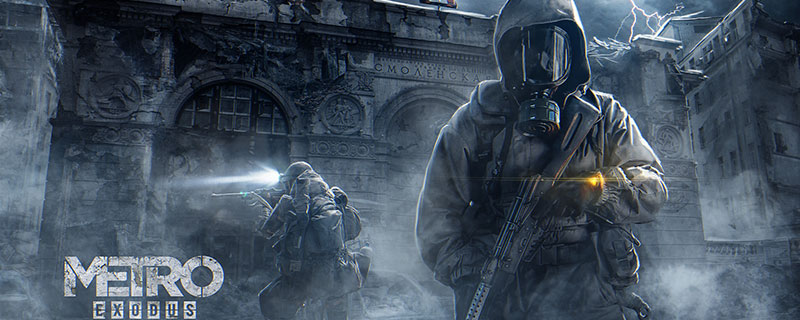
The Metro franchise stands proud as one of the most successful cross-media experiments of the 21st century. Spanning three official books, three official video games and dozens of spin-off books, a successful board game, a massive community and even a movie in the works. It is one of the most beloved pieces of post-apocalyptic fiction in both gaming and literature and has found success all over the world. Today we will be taking a brief look at the history of not only the amazing video games, but also the books that started it all.
Metro 2033 (Novel, 2005)
The book that started it all tells the tough and often heartbreaking story of Artyom, a young man steeling himself for an adventure to save his home from monsters, whose very presence is spit in the face of humankind. A classic tale of fiction? Maybe, but what makes it so enthralling is the world the author Dmitry Glukhovsky envisioned. His home is not a medieval village or space station, but rather the Moscow Metro station, VDNKh (“Exhibition”). The rest of the world is not represented by brave kingdoms or united human forces, but just a desolate few thousand survivors, huddled together in the gigantic, astoundingly massive underground complex of the Moscow Metro and the adjacent underground bunkers, sewers, and catacombs. They are the scant traces of human life remaining from an all-out nuclear war that engulfed the entire world. A war so devastating and inhumane that even experimental biological and chemical fury was unleashed to devastate and haunt the few survivors of the initial annihilation. The monsters are not creatures of magic and myth, but mutated animals or humans, military experiments, and ghastly beings that bid their time underground for thousands of years, waiting for man’s final hour to emerge from the darkness. Tears in reality itself, paranormal phenomena and psychological horror are faced not by brave heroes, but factions desperate for survival—sometimes so much so that they turn to hateful ideologies or descend into insane cults that eclipse any monstrosity that has ever been for their terror and brutality. And even in such a world, the power of the human spirit plays out. It does deserve its hype.
The world Dmitri has created is harsh and pessimistic with almost no hope in sight. It is a great read for those that can stomach such macabre fiction and deal with gut-wrenching endings. The constant blend of rumor and fact within its own world gets the imagination going, with the constant affirmation or twisting of said legends and rumors fueling the fire that is the reader’s imagination. Make no mistake, it is not a perfect piece of literature, as evidenced by the legitimate criticism of both the English translation’s poor quality and the amount of time it spends on certain themes and ideas, crippling the pacing and progression of certain chapters. In spite of these flaws, Glukhovsky’s novel is an awesome read.
But why call it experimental? Metro 2033 first appeared online in 2002 and later became an interactive experiment, drawing in thousands of readers from around Russia and abroad. The discussions and critique given by so many readers and writers helped the then newbie author get a good feel for his title. Construction workers who helped build the Metro, urban explorers, other authors and any number of others pitched in to create a frighteningly real world. Throughout its development and even beyond, the book has been free online for anyone (who could read Russian). Despite that free status, the book still became a nationwide bestseller when it was published. Today it is a worldwide bestseller and has been translated into many languages, becoming a modern day classic of its genre.
Metro 2034 (Novel, 2009)
As the previous book was garnering attention, Dmitry made two decisions that would propel the series into a cross-author, cross-medium experience like almost no other. But before those could bear fruit, he released a second part of the book series, this time not as a fledgling novelist but an award-winning creator with two books under his belt who is serving an audience. It is here that a small split within the fanbase formed. Metro 2034 is set in the same universe as 2033, but it is a very different beast compared to the original. No longer a dark adventure, but rather a character study with a more philosophical outlook at its own universe; this too is an interesting work and has become a bestseller in many languages. Critics praised it for its storytelling and themes, as well as Dmitry’s more mature style in giving the universe of the Metro a fresh new look. For fans of the games or the previous book, though, I’d offer a word of caution: It is not the same genre. Worst case scenario: it weirds you out. Best case: you get a new favourite book.
Once again the book, which has turned into an experiment for the community to be involved in, is free to download. The author even invited famous Russian electronic performer Dolphin to write an original soundtrack for the novel, while artist Anton Gretchko painted the illustrations.
Metro 2033 (Video Game, 2010)
The early 2000s were a tumultuous time for GSC Game World, an ambitious medium-sized developer from Ukraine. Their most hyped title yet, S.T.A.L.K.E.R.: Shadow of Chernobyl languished in development hell and continued involvement from the publisher THQ. Internal issues were also taking their toll. In the midst of these problems, a small part of the core development team, experienced RTS and FPS developers in their own right, decided to leave and form their own studio, called 4A Games (after the names of their founders). This happened but one year before Shadow of Chernobyl would actually launch, for real this time, and make a name for itself as one of PC Gaming’s greatest shooters.
Like GSC, 4A Games wants to be known for bleeding edge game design. After managing to acquire the IP rights for Metro 2033, they did something few game developers dare do – turn a successful book into a great video game. Early videos of the game from 2006 as well as leaked documents show that Metro 2033: The Last Refuge was, like STALKER, originally envisioned as an open-world game, where players would follow their own paths towards major plot points in a massive world full of side missions and mini-games. However, plans change and a safer but more structured, linear approach was chosen. Metro 2033 would now be a linear story-based game borrowing design ideas from Half-Life and Return to Castle Wolfenstein, with stealth gameplay or desperate close range combat its core gameplay loops alongside exploration. Immersion was key, and the game’s minimal UI design alongside its praiseworthy “Ranger Mode” and rich world detail proved to be crucial decisions for many.
A scene that is pure nightmare fuel.
On release the game got rave reviews from consumers and media alike. Book fans were thrilled that the developers managed to replicate the atmosphere, soul, and feel of the Metro universe. Gamers were enthralled at the thought of exploring such an interesting and unique setting, whilst critics praised the storytelling efforts. Graphics enthusiasts were pleased too, since for a time Metro 2033 was the new benchmark in PC Gaming, a game to strain the metal of all computers with high tessellation levels, amazing lighting, high-end textures and an insanely demanding per object motion blur effect.
However, the game lacked polish and suffered from mostly mediocre voice acting, bland animation quality, uneven pacing and harsh optimisation issues at launch. Others were displeased with some of the questionable boss sections or lamented the cuts and changes to the books’ story during adaptation. Despite these flaws, the game is today seen as one of the most interesting shooters of recent memory and a cult classic worthy of any gamer’s attention.
In case you didn’t know, Dmitry Glukhovsky did not write the game’s storyline, though he was supportive and helped along the way with tips and ideas.
Metro: Last Light (video game, 2013)
4A Games quickly commenced work on a follow-up to its Metro 2033 success. Dubbed Metro: Last Light, it was envisioned as a bigger, bolder, more polished continuation of what made the original so great. Dmitry was now even more involved and helpful, aiding the team and cluing them in on stuff from his next book whilst they went on borrowing elements from 2033 and 2034. No longer a retelling of one of the books, the games would now be linked thematically to the books, but otherwise go on telling their separate stories.
As it often does, disaster struck and the publisher THQ was facing financial doom. The future of the series was uncertain. After all, without a publisher it would be hard if not impossible to finish the project. Thankfully, Deep Silver came in and bought the rights, helping save the franchise’s fate. Still, things were not easy and reports came out of the awful conditions which the low budget and impossibly tight deadlines had wreaked. Even if some of the horror stories were slightly exaggerated, 4A Games had it rough and may well have pulled off a miracle in releasing such a high-quality product.
A masterpiece by Miracle Of Sound.
Last Light was even more well-received than Metro 2033. Most of the strengths of the series were kept or even enhanced, whilst aspects such as voice acting, animation, and optimization received massive overhauls that did not disappoint. Going toe to toe with Crysis 3 in technology and graphics in the same year would be impressive for any studio, but Last Light did it with only a fraction of the budget. Unfortunately, a taint would plague the successful launch as the popular Ranger Mode from the previous game was turned into a pre-order or paid DLC. This rightfully rubbed many the wrong way even if it was supposedly an older THQ-era decision.
Last Light also received DLC with a total of six packages. Most were experimenting with different types of gameplay and themes, from extreme action, dungeon craw exploration with slight open world elements, stealth, horror survival (with spiders and flamethrowers!) to even a pure AI arena and weapons shooting range. While they are generally decent content, they aren’t worth their full asking price. But the Polis Ranger mission, Spider’s Nest, and Khan missions are all highly recommended additions!
Metro Redux (video game re-release, 2014)
With the launch of the next generation of console hardware and riding on the success of Last Light, 4A games decided to bring out a remastered version of Metro 2033 and Last Light for consoles and PC. Featuring a near perfect 60 fps lock at 900p and 1080p, with settings up from Very Low to Medium-High, it represented a huge improvement for console gamers. Both titles also now have two general, slightly different game modes. Spartan is closer to Last Light’s gameplay balance, with faster paced action, while Survival is closer to the desperate, low-on-ammo engagements in the original 2033.
But 4A didn’t stop there. 2033 was updated with the newest version of the 4A engine, helping it both look and play better, with updated character models, sound, and animation tying both universes together better, and not just from a fidelity standpoint, but also in terms of art design and vision. Improvements to shooting and stealth mechanics along with revamped, bigger maps and redone cutscenes make it a true remaster, and one even PC Gamers should look into. Last Light was also remastered and, whilst there are small visual improvements there too, and the engine is even more optimized, the experience is almost exactly the same. For gamers who have yet to immerse themselves in the Metro Universe, Last Light Redux makes a lot of sense. It runs and looks a tad better whilst including all DLC, with the two game modes on top. Otherwise, if you have already played Last Light, Metro 2033 Redux is what you are looking for.
Metro 2035 (novel, 2015)
Rounding out the trilogy of books is Metro 2035, the last of the official Glukhovsky novels. Continuing the story of Artyom, it is more similar to the original book that started it all. It seems that in the years since the events of 2033, things improved little, if at all, and the mistakes of the past have yet to heal. Sick with guilt and hopelessness, Artyom, the hero of his station, is now an outcast. His marriage took a toll on his health, and all seems lost… but the night is darkest just before dawn.
2035 is seriously excellent and brings Dmitry’s journey as a writer to bear. Better paced, even better written, interesting and deep, it is perhaps my personal favourite of the Metro books. Be warned though, the book is more political in nature than previous entries. To put a positive spin on that: it is the mark of a skilled writer when he or she can make even things you disagree with enthralling. Very highly recommended and it is the set up for Metro Exodus. Faint as it may be, there is hope at the end of the dark tunnel after all.
Metro Expanded Universe
This is just too big of a topic to cover with any thoroughness, but we would at least mention the community’s involvement here. Numerous authors and writers, both amateur and professional, have joined Dmitry’s vision and introduced their own twists to the world or formula. Tabletop designers have made excellent games, and whole soundtracks and galleries were created, fan fiction, cosplay, communities, and a way for aspiring writers to make an impact… it is an awesome project. Whilst it is unfortunate that most of it has not been translated into English yet, if you liked the books or games, the rabbit-hole goes very deep and you are in for quite the experience with the expanded universe.
Metro Exodus (video game, 22nd of February 2019)
This is the third and supposedly final, and certainly the most ambitious, game in the 4A Game series. Taking place on a one-year journey across post-apocalyptic Russia, through all four seasons over a vast landmass, it is a blend of the beloved tight linear level design of previous Metro games and a quasi-STALKER sandbox experience. According to the developers, it is bigger in content and story than both previous titles combined. Better still, Dmitry is helping yet again. Will 4A Games pull it off one more time? We’ll know in a few months, but what we’ve seen so far is extremely promising. Do note that it is still technically a linear game, just one with some very open and replayable levels with multiple objectives. That sounds like a very fair compromise on paper and should satisfy most fans. We simply can’t wait to play this title!
This is just from one single level in the game!
With this we conclude our overview of the history of the Metro franchise. What started as a single boy’s dark science fiction story is now an acclaimed series of novels and some of gaming’s most beloved video game experiences. Exodus is one of the games to look out for in 2019! There is also a movie supposedly in the works but information is very sparse for now. We hope you’ve enjoyed the article and at least try out this amazing cross-media experience!






























